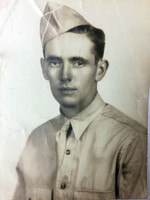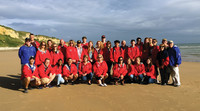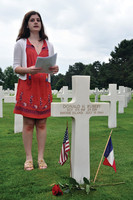By ETHAN HARTLEY -- One Toll Gate High School student and teacher team has made sure that the story of Warwick-born Sergeant Donald H. Rubery will be heard, and that his sacrifice will never be forgotten.
This item is available in full to subscribers.
We have recently launched a new and improved website. To continue reading, you will need to either log into your subscriber account, or purchase a new subscription.
If you are a current print subscriber, you can set up a free website account by clicking here.
Otherwise, click here to view your options for subscribing.
Please log in to continue |
|






They were farmers, tradesmen, doctors, engineers and salesmen; everyday Americans. They were brothers, fathers, husbands, uncles and nephews. They were the young men who stormed beaches of hailing bullets and hellfire to save the world from tyranny. Many never made it home, and many have never had their story told.
But thanks to the dedicated research and passionate drive to learn about these “silent heroes,” one Toll Gate High School student and teacher team has made sure that the story of Warwick-born Sergeant Donald H. Rubery will be heard, and that his sacrifice will never be forgotten.
Rebecca Carcieri, an upcoming junior at Toll Gate, and Dr. Thalia Wood, head of the school’s Social Studies department, were one of 15 student-teacher pairs from across the country to be selected to go on a seven-day trip to Normandy to immerse themselves in the history of the area and ultimately deliver a eulogy at the gravesite of an American soldier who died in the campaign to liberate France, via the Normandy: Sacrifice for Freedom Albert H. Small Student and Teacher Institute program.
Carcieri began her journey researching the soldiers from Warwick that perished in World War II and, when the niece and grandnephews of Rubery contacted the Beacon advocating on behalf of their veteran, late uncle after an initial article ran about the program in January, she knew that she had found her silent hero.
According to Carcieri’s research, Rubery was born on April 23, 1918 in the Norwood section of Warwick to his parents, Edith and Harry. He had two sisters, including a twin, Beverley, and an older sister, Myrtle. He attended the Norwood School where he played football for the Norwood Knights.
Rubery dropped out of high school after his sophomore year to help his family financially during the Great Depression. He went to work at Universal Winding Company as a tool attendant, and was a volunteer firefighter for the Norwood Fire Department around this time as well.
In May of 1942, Rubery was drafted in the United States Army. He completed basic training at Camp Blanding in Starke, Fla. and shipped overseas on the RMS Queen Mary in the fall of 1943. He landed ashore at Omaha Beach in Normandy the day after D-Day, June 7, 1944. Rubery attained the rank of Sergeant in the 29th Infantry Division, 175th Infantry Regiment, 2nd Battalion, Company F.
The 175th Regiment fought at the French city of Saint Lô in July, 1944. The fight for the strategic crossroads city was notoriously destructive, and allied forces ultimately leveled about 95 percent of the city in bombing raids, leading to the city being dubbed “The Capital of Ruins.” Rubery died from the blast of an artillery shell on July 15, 1944 at the Battle of Saint Lô along the Bayeux Highway.
In her eulogy to Rubery, Carcieri included what she had learned from Rubery’s surviving niece, Marilyn Fraser, about the day the War Department arrived to deliver the news of his death.
“Two or three men came with their big heavy dark coats...so, I went off for the afternoon,” Fraser said. “I tell you...it was a horror.”
Rubery’s family chose to allow his remains to be buried in the American Cemetery in Normandy. Carcieri and Wood brought flowers and a photo of Rubery to the site, which they described as a very peaceful and well-maintained cemetery. Nearly 10,000 Americans are buried there.
“From the beginning of this project I knew I was going to learn so much and that it was going to be an incredible experience, but it was so much more than that,” said Carcieri in reflection her trip. “I was able to research at the National Archives, which was so cool. Then being in France, being at the sites and the beaches where all this happened, giving the eulogy at the American cemetery in Normandy, it was life changing.”
Wood had been to Normandy prior to the trip, but said that the experience was especially important because of how many sites the students and teachers got to see. She spoke of seeing the Sainte Mère Eglise commune, made famous by a scene in “The Longest Day,” a 1962 war film about the Normandy invasion which depicted a real event where a paratrooper got his parachute caught on the town’s church steeple and pretended to be dead for hours before being captured by the Germans. He later amazingly escaped and rejoined his division.
Wood said that many of the “picturesque” villages and towns in the French countryside required significant rebuilding, following the destructive force of the war.
“That was one of the important things we learned, was the devastation that the French endured during four years of occupation; the loss of life, the destruction of their towns and cities and their fields,” Wood said.
Carcieri got to meet with Rubery’s surviving family prior to leaving, and said they were ecstatic that she was doing such an extensive project to preserve their uncle’s memory. She said that she will be reconnecting with them again now that the trip has concluded.
Carcieri and Wood were chosen out of 82 applicants to go on the trip. It is the seventh year of the program, which was started by veteran Albert H. Small seven years ago in order to ensure that students and young people understand and never forget the sacrifice that the soldiers in World War II made.
In her eulogy to Rubery, Carcieri indicated that the mission of the program would be a success.
“Although Sgt. Rubery died at the young age of 26, we honor him for his contributions to the war effort and the Allied victory. Sgt. Rubery made the ultimate sacrifice to ensure America's freedom and democracy,” she read. “Today, there are several monuments honoring him in his hometown of Warwick, Rhode Island. Sgt. Rubery, your sacrifice will never be forgotten, and we thank you for your service.”
1 comment on this item Please log in to comment by clicking here
RISchadenfreude
Great story, a great program, and a trip which will be remembered for a lifetime.
I visited Coleville-sur-Mer in 1984 and was able to take a charcoal-on-paper impression (not allowed anymore) and photos of my Great Uncle's cross; he was wounded during the invasion and died before he could be evacuated to a hospital ship. His brother came ashore in September of '44 but never got to see where he was buried- I was able to give him the impression of the cross and some photos so he could finally see his brother's grave.
Thursday, August 17, 2017 Report this